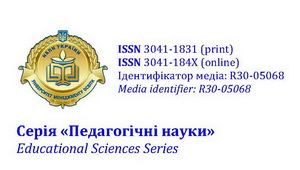Psychological and pedagogical conditions for activating pupils’ cognitive activity
Анотація
Ключові слова
Повний текст:
PDF (English)Посилання
REFERENCES / СПИСОК ВИКОРИСТАНИХ ДЖЕРЕЛ
A. N. Abbasov, H. Ə. Əlizadə, Pedaqogika. Bakı, Azərbaycan: Mütərcim, 2024.
A. N. Abbasov, Pedaqogika. Bakı, Azərbaycan: Mütərcim, 2021.
F. M. Allahverdiyeva, Pedaqogika. Bakı, Azərbaycan: Elm və təhsil, 2018.
Azərbaycan Milli Ensiklopediyası. Bakı, Azərbaycan: Azərbaycan Milli Ensiklopediyası Elmi Mərkəzi, 2018, 10 cilddə.
Ə. Ə. Əlizadə, Pedaqoji psixologiya (I, II kitab). Bakı, Azərbaycan: APU-nun nəşriyyatı, 2010.
R. İ. Əliyev, Şəxsiyyət psixologiyası. Bakı, Azərbaycan: ADPU-nun nəşriyyatı, 2018.
R. İ. Əliyev, Məktəbə psixoloji xidmətin aktual məsələləri. Bakı, Azərbaycan: Nurlan, 2004.
Ə. Ə. Qədirov, N. Ə. Xəlilov, Yaş psixologiyası. Gəncə, Azərbaycan, 2017.
N. M. Kazımov, Məktəb pedaqogikası. Bakı, Azərbaycan: OKA Ofset, 2019.
Y. A. Komenski, Böyük didaktika; F. A. Rüstəmov, Red. Bakı, Azərbaycan: Elm və təhsil, 2012.
Z. Freud, Psychoanalysis. St. Petersburg, Russia: Maikops, 2011. (російською).
Sh. A. Amonashvili, Training. Assessment. Mark. Moscow, Russia: Pedagogy, 1980. (російською).
V. K. Vilyunas, Psychological Mechanisms of Human Motivation. Riga, Latvia: UR Publishing House, 2016. (російською).
N. S. Leites, Mental abilities and age. Moscow, Russia: Pedagogy, 1971. (російською).
J. Piaget, Selected Works. Moscow, Russia: Prosveshchenie, 2019. (російською).
TRANSLATED AND TRANSLITERATED / ПЕРЕКЛАД, ТРАНСЛІТЕРАЦІЯ
A. N. Abbasov, H. A. Alizadeh, Pedagogy. Baku, Azerbaijan: Mutardjim, 2024. (in Azerbaijani).
A. N. Abbasov, Pedagogy. Baku, Azerbaijan: Mutardjim, 2021. (in Azerbaijani).
F. M. Allahverdiyeva, Pedagogy. Baku, Azerbaijan: Science and education, 2018. (in Azerbaijani).
Azerbaijan National Encyclopedia. Baku, Azerbaijan: Scientific Center of the National Encyclopedia of Azerbaijan, 2018, 10 volumes. (in Azerbaijani).
A. A. Alizade, Pedagogical Psychology (Books I, II). Baku, Azerbaijan: APU Publishing House, 2010. (in Azerbaijani).
R. І. Aliyev, Personality Psychology. Baku, Azerbaijan: Publishing House of Azerbaijan State University of Political Sciences, 2018. (in Azerbaijani).
R. І. Aliyev, Actual issues of school psychological service. Baku, Azerbaijan: Nurlan, 2004. (in Azerbaijani).
A. A. Gadirov, N. A. Khalilov, Age Psychology. Ganja, Azerbaijan, 2017. (in Azerbaijani).
N. M. Kazimov, School Pedagogics. Baku, Azerbaijan: OKA Offset, 2019. (in Azerbaijani).
Ya. A. Komensky, Great Didactics; F. A. Rustamov, Ed. Baku, Azerbaijan: Science and Education, 2012. (in Azerbaijani).
Z. Freud, Psychoanalysis. St. Petersburg, Russia: Maikops, 2011. (in Russian).
Sh. A. Amonashvili, Training. Assessment. Mark. Moscow, Russia: Pedagogy, 1980. (in Russian).
V. K. Vilyunas, Psychological mechanisms of human motivation. Riga, Latvia: UR Publishing House, 2016. (in Russian).
N. S. Leites, Mental abilities and age. Moscow, Russia: Pedagogy, 1971. (in Russian).
J. Piaget, Selected Works. Moscow, Russia: Prosveshchenie, 2019. (in Russian).
Посилання
- Поки немає зовнішніх посилань.
